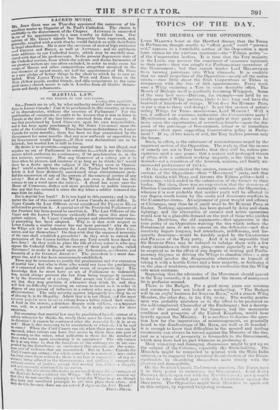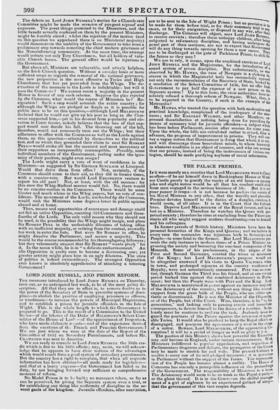TOPICS OF TIIE DAY.
THE DILEMMA OF THE OPPOSITION.
LORD NIAHox's boast at the Hertford dinner, that the Tories in Parliament, though unable to " effect good," could " prevent
evil," appears to a formidable section of the Onposition a most lame excuse for the cautious inactivity—the " Fabian policy '- of the Conservative leaders. It is true that the Tory majority in the Lords can prevent the enactment of measures injurious to their party—they can cripple the Parliamentary operations of the Government ; but they cannot hinder Lord Mat.nouata from turning patronage into Whirs channels. It is credible the Government ; but they cannot hinder Lord Mat.nouata from turning patronage into Whirs channels. It is credible
that no small proportion of the Opposition—nearly all the active spirits— care little about the Irish Corporations or Tithes in comparison with the loss of rich appointments. Every week sees a Whig replacing a Tory in some desirable office. The Bench of Bishops itself is gradually becoming Whiggish. Some of the very best sees—Durham, for example—are held by re- cently-promoted Whig prelates, likely to live long and have the bestowal of hundreds of livings. What does Sir ROBERT PEEL to put a stop to these evil doings? Is not this system of substi- tuting Whigs for Tories mischievous, Lord MAHON ? Will it not, if suffered to continue, undermine the Conservative party ? Mystification aside, does not the strength of that party rest far more upon the opportunities of rewarding friends—upon the dis- posal of the patronage of Government, actual or in immediate prospect—than upon supporting Conservative policy in Parlia- ment ? If so, of two kinds or evil, the Tory leaders prevent only the lesser.
Such, in effect, is the substance of remonstrances urged by the impatient section of the Opposition. The reply is. that the means of remedy are not in Tory hands ; that they will be, unless pre- cipitation spoil a sure game ; that a certain and prolonged tenure of office, with a sufficient working majority, is the thing to be desired—not a repetition of the feverish, anxious, and finally un- successful performance of 1834-5. At the commencement of the session, rumour said, that the two sections of the Opposition—their "Movement " party, and that which thinks with PEEL and favours the Fabian policy—held a confin.ence, whirl, ended in the submission of the former to their leader. But then, there was an exp,clat ion that the decisions of Election Committees would materially reinforce the Opposition; whereas it is now probable that neither party will be affected in any degree worth notice by the costly and wearisome conflicts in the Committee-rooms. An argument of great weight and efficacy at Christmas, may Ihus be of small avail to Sir ROBERT PEEL at Easter. Nothing, apparently, has been gained by delay and sham fighting; and the alternative of earnest and active operations would now be a plausible demand on the part of those who yielded before. Doubtless the old arguments—that aggression is the true policy of an Doubtless, wanting the ties which induce the Government men to act in concert on the defensive—and that inactivity begets languor, bad attendance, indifference, and fre- quently desertion—would be forcibly urged by the CHANDOSES and PRAEDS of the Tory party'. And it is not impossible that Sir ROBERT PEEL may be induced to indulge them with a few sharp skirmishes on their own plan,—more especially as he may be sceptical as to the effect of any degree of beating and Parlia- mentary disgrace in driving the Whigs to abandon office ; a step that would involve the disagreeable alternative to himself of taking it with a hostile Court and a bare majority, or declining it on the plea of weakness, amounting to a confttssion that the Whig rule must continue.
Supposing that the advocates of the Movement should prevail in the Tory councils, it is manifest that the means of annoyance lie in profusion around.
There is the Budget. For a good many years our revenue awl commerce have not looked so untbriving. "The Budget will be an aufid business for SPRING RICE," said a stanch Whig Member, the other day, to his City crony. The worthy gentle- man was probably mistaken as to the effect to be produced on the self-complacent Chancellor of the Exchequer ; but a descrip- tion of the actual state of the finances, and the mercantile condition and prospects of the United Kingdom, would bear heavily against the Ministry. It is needless to discuss the ques- tion how far the imputations of mismanagement, so generally heard to the disadvantage of Mr. RICE, are well or ill founded : it is enough to know that difficulties in the monied and trading community can always be turned against the Ministry of the day, just as a season of prosperity is favourable to the Government, which may have had no part whatever in producing it.
Most annoying and damaging discussions might be got up on the subject of the Colonies, especially the Slave-holding. The Ministers might be compelled to quarrel with the West India interest, or to augment the prevalent dissatisfiiction of the Eman- cipationists by identifying themselves more closely with the planters and monopolists.
On the Scottish Church Endowment qtrestinn, the Tories have it in their power to embarrass the Government. Lerd mist RussEst. dreads open war with the EAA:is!riwuit ; and it would be fatal to take decideul part with the Churchmen aping the Dissenters. The Opposition might force Minktel-s to speak oat or5 this subject, by repeated balg,eriog motions. The debate on Lord JOHN RUSSELL'S motion for a Church-rate Committee might be made the . occasion of pungent reproof and exposure. The great things promised to the Dissenters, and the little benefit actually conferred on them by the present Ministers, might be forcibly stated ; bast the rejection of the motion (and on this question we apprehend there is no Ministerial majority) would demonstrate the inability of the Government to take even a preliminary step towards removing the chief modern grievance of the Nonconforming community. At the same time, the attempt would irritate not only Tory Churchmen, but all holders of valu- able Church leases. The general effect would be injurious to the Government.
But above all, Ministers are vulnerable, and utterly helpless, on the Irish Church question. Without a sounder basis or more sufficient scope as regards the removal of the national grievance, the new proposition is the most offensive to Tories and High Churchmen that has yet proceeded from the Whigs. The de- struction of the measure in the Lords is indubitable : but will it puss the Commons ? We cannot count a majority in the present
House in favour of any such scheme. Suppose the plan rejected by the Commons, what would the course of Ministers be? Re-
signation? Sueh a step would astonish the entire country ; for although the Whigs are pledged as deeply as it is possible for public men to be on this question,—although Lord MELBOURNE
declared that he would not give up his post as long as the Com- mons supported him,—yet in his descent from popularity and ele- vation in Court favour, nobody believes that the loss of that sup- port would now decide his fall. The throwing out of the bill,
therefore, would not necessarily turn out the Whigs ; but their adherence to office with the Commons as well as the Lords against them, on this question—selected by themselves as the political test, and on which they grounded their claim to oust Sir ROBERT PEEL—would strike all but the meanest and most mercenary of
their supporters as inexpressibly contemptible. Possibly, some individual members of the Government, reeling under the igno- miny of their position, might even resign !
The Lords might carry a vote of want of confidence in the Ministers—as suggested by Sir GEORGE SINCLAIR at Liverpool. Would that drive them from office ? Not, certainly, if the Commons should come to their aid, as they did in former times, With Et counter-vote. But would Lord EBRINGTON venture to repeat his old part? Not, at least, with the old success : for this once the Whig-Radical muster would fail. No, there would be no counter-motion in the Commons. There would he some
bluster and much whine in the Whig papers, but no vote of con- fidence. The movement of the Lords, unchecked by the Commons, would sink the Ministers some degrees lower in public opinion abroad and at home.
Thus, means and opportunities of' annoyance and damage could not fail an active Opposition, counting 320 Commoners and three. fourths of the Lords. The only valid reason why they should not be used, is the possibility that the Whigs might resign, and place Sir ROBERT PEEL in the undesirable dilemma of taking office
with an inefficient majority, or retiring from the contest, avowedly too weak to enter the lists. But were Sir ROBERT in office, he
might dissolve the Parliament, and secure a majority. This would be the course recommended by his thoroughgoing followers; but they vehemently suspect that Sir ROBERT "wants pluck" for it. In the mean while, he is in "a delicate embarrassment." An idle Opposition is pretty sure to become a decreasing one; yet greater activity might place him in an ugly dilemma. The state of politics is indeed extraordinary. The strongest Opposition ever known is absolutely apprehensive of attacking a tottering Government



























 Previous page
Previous page